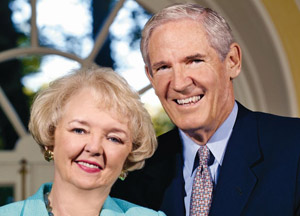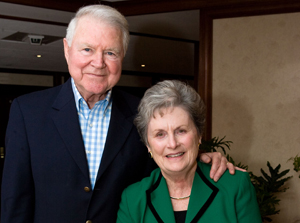
Lead gifts totaling $25 million by two of Washington University in St. Louis’ most dedicated benefactors will support the university’s Olin Business School and its plans for two new innovative facilities for graduate education.
The gifts — $15 million from Charles F. and Joanne Knight and $10 million from George and Carol Bauer through the Bauer Foundation — will provide the capital foundation for Olin’s second century of top-ranked undergraduate and graduate business programs, which have grown steadily since the establishment of the school in 1917.
In announcing the gifts, Chancellor Mark S. Wrighton praised the forward-thinking philanthropists and thanked them for their extraordinary faith in and support of the university, and especially for their efforts over the years to help make Olin the business school it is today.

“The exemplary generosity and leadership of Joanne and Chuck Knight and Carol and George Bauer are providing an important investment in Olin’s continued success among top business schools,” Wrighton says.
“Our gratitude to these wonderful friends for their critical lead support cannot be overstated,” Wrighton continues, “for not only are they helping us realize Olin’s future plans, but they also will surely serve to inspire others to participate in its growth.”
Groundbreaking on the $90 million project is scheduled for around June 1, 2012, provided sufficient progress has been made to secure the required additional funding. Construction of the two new buildings, which will total 166,000 square feet on five levels, is scheduled to be completed by December 2013.
The design of the business school complex is a collaboration among two architectural firms, Moore Ruble Yudell, architect-of-record, and Mackey Mitchell Architects, associate architect, and two mechanical engineering firms, Buro Happold and William Tao & Associates. Tarlton Corp. has been selected as the pre-construction services provider.
The buildings, to be built on the current site of Eliot Hall and adjacent to the Charles F. Knight Executive Education Center, will include seven classrooms, an auditorium, 75 faculty offices, a glass atrium and numerous forums, lounges, offices and other spaces for interaction and collaboration.
“In recent years, the Olin School has become a recognized global leader in business education,” the Knights said. “Additionally, the school and all of Washington University are vitally important assets in so many ways for St. Louis. We are pleased to support the Olin School’s continued growth, both for its international impact and for its importance in our community.”
“This is an exciting time for the business school and these new facilities should continue the momentum already generated,” says George Bauer. “They will not only assure the traditional architectural continuity of the campus, but will also introduce some additional striking features.”
As Olin’s reputation has grown, so has demand from new applicants and transfer students within the university. The business school’s enrollment has surpassed the capacity of its current home, Simon Hall, according to Dean Mahendra Gupta, PhD.
“In our planning, we realized that significant new resources and spaces were needed if we were going to continue our trajectory as a business education leader and accommodate more top-flight faculty, more talented students, more programs for business-involved applied learning, and more interdisciplinary collaborations,” says Gupta, who is also the Geraldine J. and Robert L. Virgil Professor of Accounting and Management.
“With these transformative gifts, the Knights and the Bauers are making an investment in Olin’s future and, more importantly, in the futures of innumerable students, teachers, researchers and business leaders who will be armed with the knowledge to affect positive change in the world,” Gupta says.
Expanded collaboration among faculty, students and business is a core component of Olin’s strategic plan, and Gupta says the new buildings will help achieve that goal. The two new facilities will provide resources and technology to serve these interconnected groups.
The Olin Business School is considered one of the country’s leading business schools and is gaining in reputation across the globe.
The most recent rankings bear this out: Olin’s MBA program and its Professional MBA program are ranked No. 20 and No. 10, respectively, by U.S. News & World Report. The Financial Times ranks Olin’s Executive MBA program in Shanghai in the top 15 global programs and No. 2 in mainland China, and also ranks its specialized master’s program in finance No. 2 in the U.S. The Wall Street Journal’s 2010 rankings placed the school’s Executive MBA program, with locations in St. Louis, Kansas City and Shanghai, in the No. 2 position.
In the undergraduate category, Olin has a place in the Fisk Guide’s coveted top 10, and is ranked No. 14 by Bloomberg Businessweek.
Olin has seen dramatic student growth in recent years, especially in its graduate-level programs. Since 1980, the number of graduate business students has grown from 436 to 1,045 students, spurred in part by the popularity of specialized master’s programs in accounting, finance and supply chain management, in addition to its Executive MBA, all of which did not exist three decades ago.
Enrollment in the doctoral program also has seen impressive gains, jumping from nine students in 1980 to 52 today.
In addition, the number of Olin’s undergraduate students has more than doubled during this same time period, from 365 students in 1980 to 753 today.
With this kind of growth, an expansion of facilities is a clear priority, according to Gupta.
“Our growth has far exceeded the planned capacity of our existing buildings, Simon Hall and the Charles F. Knight Executive Education Center,” he says. “These generous gifts, with additional support from our loyal alumni and friends, will help break through that physical barrier and allow us to continue building a world-class business school that will successfully prepare our students for the challenges of the 21st century.”
Wrighton says that Washington University’s progress has always depended on significant philanthropic support at critical junctures.
“At this challenging time, we are grateful for the Knights’ and the Bauers’ contributions to a new stage of development, which will be of great benefit to the business community,” he says. “Our greatest supporters, exemplified by the Bauers and the Knights, are proud of our progress and the lasting contributions our faculty and students are making to the university, the region and the world.”
The Donors
Joanne and Charles F. Knight, Carol and George Bauer
Through their vision, leadership and dedication, the Knights and the Bauers have left their mark on Washington University and have made lasting contributions to teaching, research and society.
About the Knights:
For Charles F. Knight, chief executive officer at Emerson for 27 years and now chairman emeritus, this is not the first time he has led the initiative to advance the Olin School. In 1980, he chaired the Business School Task Force, and in 1995, he volunteered again to lead the school’s advisory group, Olin’s National Council.
Thanks to a combined gift from the Knights and Emerson, Olin realized one of its major objectives — to build a first-class, residential executive education center. The Charles F. Knight Executive Education Center was dedicated in 2001, and the Knights endowed a distinguished directorship in executive education to provide leadership for the center.
Knight also was a member of the university’s Board of Trustees from 1977 to 1990, a pivotal period of growth in its history.
Knight’s philanthropic involvement extends throughout St. Louis, and he is especially interested in organizations devoted to higher education, health care and youth assistance.
From 1991-98, he served in a number of leadership capacities for Barnes Hospital, overseeing the creation of Barnes-Jewish Inc. and, later, the BJC Health System. He is emeritus chairman for life of Barnes-Jewish Hospital.
Joanne Knight has been especially engaged in advancing the work of the Alzheimer’s Association of St. Louis, for which she has served in several volunteer and advisory positions, including a term as president. She also has helped lead the Central Institute for the Deaf for nearly 30 years as a member of its board of directors.
Her service to Washington University includes charter membership on the Alvin J. Siteman Cancer Center Community Advisory Board and serving as a member of the School of Art National Council.
Over the years, the Knights’ deep commitment to medical advancement has combined with their philanthropy on many occasions, including the establishment of the Joanne Knight Breast Health Center and Breast Cancer Program in the Alvin J. Siteman Cancer Center, the Charles F. Knight Emergency Trauma Center, and the Charles F. and Joanne Knight Distinguished Professorship in Orthopedic Surgery.
In addition to receiving an honorary doctor of science degree in 1996 from Washington University, Charles Knight received the university’s Robert S. Brookings Award in 1999 and its Eliot Society Search Award in 2007. He received the Olin School’s Dean’s Medal in 1993. In 2010, Joanne Knight received an honorary doctor of humanities degree from the university.
About the Bauers:
Although now residing in Wilton, Conn., George Bauer is originally from rural Missouri. After earning bachelor’s and master’s degrees from Washington University’s School of Engineering & Applied Science in 1953 and 1959, respectively, he embarked on a 31-year career with IBM that took him far from the family farm.
At IBM, he served in a variety of executive positions in marketing, finance and business systems. He served as a group director for Europe, Africa and the Middle East, and was an early member of the group in the United Kingdom that launched IBM in the consulting business. Upon retiring in 1987, he founded an investment banking firm, The GPB Group Ltd.
Bauer serves Washington University as a member of the Board of Trustees and the New York Regional Cabinet, and he and his wife, Carol, are involved in a number of philanthropic activities.
Together, the Bauers support institutions that serve a vital function in their communities. At Washington University, this has included serving on the Olin Business School’s National Council, establishing a scholarship for students experiencing unforeseen financial difficulties and, through the Bauer Foundation, establishing the George and Carol Bauer Professorship in Organizational Ethics and Governance.
At the university’s Founders Day celebration on Nov. 5, 2011, the Bauers received the Robert S. Brookings Award in recognition of their extraordinary generosity and commitment. In 2009, the School of Engineering & Applied Science honored him with a Distinguished Engineering Alumni Award.
The Bauers also are dedicated to ensuring quality medical services for their community in Wilton, and Carol Bauer’s long-term involvement at the Norwalk Hospital includes being the former chairperson of the board of trustees, founder and leader of the hospital’s ER Reception Volunteers, and currently serving as a chaplain.
Through the Bauer Foundation, they make the “Sunday/Monday connection,” a term they use to describe their goal of bridging the spiritual and the secular in their lives.
Among the initiatives they have supported are the creation of a local chapter of the national “I Have a Dream” program, which ensures a college education for underprivileged students who finish high school, subsidizes enrichment classes for public school students, and helps build safe playgrounds for children with disabilities. The Bauers also support the “New Life” Center in Chiang Mai, Thailand, which brings young girls from the brothels of Bangkok to halfway houses in Chiang Mai to continue their education and integrate back into the Thai society.